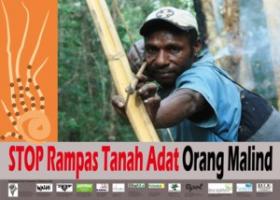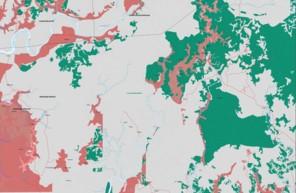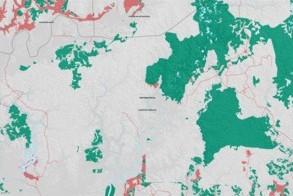Indonesia: Confront Intolerance in 2013
Protect Religious Minorities, Free Political Prisoners
Indonesia’s growing regional prominence is being
held back by the government’s failure to confront intolerance of the
country’s diverse political and religious views. To join the ranks of
rights-respecting countries, the Indonesian government needs to act to
protect the rights of all its citizens.
(London) – Indonesian authorities throughout
2012 failed to defend threatened religious minorities and imprisoned
peaceful activists for their political views, Human Rights Watch said
today in its World Report 2013.
In its 665-page report, Human Rights Watch assessed progress on human rights during the past year in more than 90 countries, including an analysis of the aftermath of the Arab Spring.
The Indonesian government should enforce laws protecting religious freedom, and review hundreds of discriminatory local bylaws that victimize women and religious minorities, Human Rights Watch said. It should also release the dozens of political prisoners, mostly Papuan and Moluccan activists, imprisoned for peaceful dissent, Human Rights Watch said.
“Indonesia’s growing regional prominence is being held back by the government’s failure to confront intolerance of the country’s diverse political and religious views,” said Phelim Kine, deputy Asia director at Human Rights Watch. “To join the ranks of rights-respecting countries, the Indonesian government needs to act to protect the rights of all its citizens.”
Throughout 2012, Indonesian authorities took inadequate action against Islamist militants who mobilized mobs to attack religious minorities, Human Rights Watch said. According to Indonesia’s Setara Institute, which monitors religious freedom, attacks against religious minorities increased from 144 cases in 2011 to 264 cases in 2012. Light prison terms sought against perpetrators sent a message of official tolerance for such mob violence. Dozens of regulations, including ministerial decrees on building houses of worship, also fostered discrimination and intolerance. During 2012, dozens of minority Christian congregations reported that local government officials arbitrarily refused to issue them building permits, even where they had Supreme Court approval.
Senior government officials, including Religious Affairs Minister Suryadharma Ali and Home Affairs Minister Gamawan Fauzi, offered “relocation” of affected religious minorities rather than legal protection of their rights. Suryadharma Ali, in September 2012, made highly discriminatory remarks about the Ahmadiyah and Shia communities, suggesting the beliefs of both were heretical.
Indonesian police in 2012 remained complicit in acts of violence against religious minorities. On August 26, police officers stood by while hundreds of Sunni militants burned down 50 homes in a Shia village on Madura Island, killing one man. Indonesian authorities also failed to adequately protect artists, writers, and media companies targeted by militant Islamist groups, who disrupted the May book tour of Muslim-Canadian writer Irshad Manji in Jakarta and Yogyakarta, and caused the cancellation of a Lady Gaga concert in Jakarta in June.
Aceh's provincial government enforced its repressive Sharia (Islamic law)-inspired dress code and law on “seclusion,” banning association between unmarried men and women in “isolated” places. The provisions are enforced primarily through a Sharia police force that harasses, intimidates, and arbitrarily arrests and detains women and men. In September, a 16-year-old girl arrested by the Sharia police in Langsa regency committed suicide, after two daily newspapers reported that she was a “prostitute.” In December, the mayor of Lhokseumawe cited Sharia to justify a ban on women straddling motorcycles.
“Violence against religious minorities will only get worse so long as the Indonesian government encourages or ignores attacks by Islamist militants,” Kine said. “Indonesia’s leaders need to demonstrate real leadership and denounce the violence, revise discriminatory laws, and ensure those responsible for abuses are punished.”
The Indonesian government continued to prosecute peaceful political activists in Papua and the Moluccas Islands, conflating freedom of expression and association with armed separatism, Human Rights Watch said. In March 2012, a court in Jayapura, Papua sentenced five activists to three years in prison for declaring Papua’s independence from Indonesia in 2011.
In May 2012, the Indonesian government dismissed recommendations to release political prisoners made by 11 United Nations member states during the UN Universal Periodic Review (UPR) of Indonesia’s human rights record. Those prisoners are serving sentences of up to 20 years for acts of peaceful protest, including staging protest dances or raising separatist flags. They include Papuan independence activist Filep Karma, whom the UN Working Group on Arbitrary Detention in 2011 called on the Indonesian government to release.
The government accepted some of the UN’s UPR recommendations, including extending invitations to the three UN special rapporteurs on the rights to health, adequate housing, and freedom of expression, to visit the country. Such visits could help identify and resolve related rights abuses, though these visits have yet to occur.
“Indonesia adds insult to injury by arresting peaceful activists and then dismissing the concerns raised by the UN and other governments,” Kine said. “These prisoners cast a scandalous shadow on Indonesia’s claim to be a rights-respecting country that abides by the rule of law.”
Peace
Santon!!
In its 665-page report, Human Rights Watch assessed progress on human rights during the past year in more than 90 countries, including an analysis of the aftermath of the Arab Spring.
The Indonesian government should enforce laws protecting religious freedom, and review hundreds of discriminatory local bylaws that victimize women and religious minorities, Human Rights Watch said. It should also release the dozens of political prisoners, mostly Papuan and Moluccan activists, imprisoned for peaceful dissent, Human Rights Watch said.
“Indonesia’s growing regional prominence is being held back by the government’s failure to confront intolerance of the country’s diverse political and religious views,” said Phelim Kine, deputy Asia director at Human Rights Watch. “To join the ranks of rights-respecting countries, the Indonesian government needs to act to protect the rights of all its citizens.”
Throughout 2012, Indonesian authorities took inadequate action against Islamist militants who mobilized mobs to attack religious minorities, Human Rights Watch said. According to Indonesia’s Setara Institute, which monitors religious freedom, attacks against religious minorities increased from 144 cases in 2011 to 264 cases in 2012. Light prison terms sought against perpetrators sent a message of official tolerance for such mob violence. Dozens of regulations, including ministerial decrees on building houses of worship, also fostered discrimination and intolerance. During 2012, dozens of minority Christian congregations reported that local government officials arbitrarily refused to issue them building permits, even where they had Supreme Court approval.
Senior government officials, including Religious Affairs Minister Suryadharma Ali and Home Affairs Minister Gamawan Fauzi, offered “relocation” of affected religious minorities rather than legal protection of their rights. Suryadharma Ali, in September 2012, made highly discriminatory remarks about the Ahmadiyah and Shia communities, suggesting the beliefs of both were heretical.
Indonesian police in 2012 remained complicit in acts of violence against religious minorities. On August 26, police officers stood by while hundreds of Sunni militants burned down 50 homes in a Shia village on Madura Island, killing one man. Indonesian authorities also failed to adequately protect artists, writers, and media companies targeted by militant Islamist groups, who disrupted the May book tour of Muslim-Canadian writer Irshad Manji in Jakarta and Yogyakarta, and caused the cancellation of a Lady Gaga concert in Jakarta in June.
Aceh's provincial government enforced its repressive Sharia (Islamic law)-inspired dress code and law on “seclusion,” banning association between unmarried men and women in “isolated” places. The provisions are enforced primarily through a Sharia police force that harasses, intimidates, and arbitrarily arrests and detains women and men. In September, a 16-year-old girl arrested by the Sharia police in Langsa regency committed suicide, after two daily newspapers reported that she was a “prostitute.” In December, the mayor of Lhokseumawe cited Sharia to justify a ban on women straddling motorcycles.
“Violence against religious minorities will only get worse so long as the Indonesian government encourages or ignores attacks by Islamist militants,” Kine said. “Indonesia’s leaders need to demonstrate real leadership and denounce the violence, revise discriminatory laws, and ensure those responsible for abuses are punished.”
The Indonesian government continued to prosecute peaceful political activists in Papua and the Moluccas Islands, conflating freedom of expression and association with armed separatism, Human Rights Watch said. In March 2012, a court in Jayapura, Papua sentenced five activists to three years in prison for declaring Papua’s independence from Indonesia in 2011.
In May 2012, the Indonesian government dismissed recommendations to release political prisoners made by 11 United Nations member states during the UN Universal Periodic Review (UPR) of Indonesia’s human rights record. Those prisoners are serving sentences of up to 20 years for acts of peaceful protest, including staging protest dances or raising separatist flags. They include Papuan independence activist Filep Karma, whom the UN Working Group on Arbitrary Detention in 2011 called on the Indonesian government to release.
The government accepted some of the UN’s UPR recommendations, including extending invitations to the three UN special rapporteurs on the rights to health, adequate housing, and freedom of expression, to visit the country. Such visits could help identify and resolve related rights abuses, though these visits have yet to occur.
“Indonesia adds insult to injury by arresting peaceful activists and then dismissing the concerns raised by the UN and other governments,” Kine said. “These prisoners cast a scandalous shadow on Indonesia’s claim to be a rights-respecting country that abides by the rule of law.”
Peace
Santon!!









